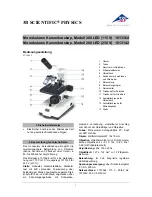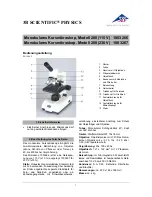
MICROSCOPY
1. Lamp
illumination
Turn the brightness control dial forward to achieve the desired
brightness.
2. Specimen
Mounting
Mounting with the cover glass facing upwards.
3. Focusing with 10X Objectives
Choose the objective 4X or 10X. Turn the coarse focusing
knob to get the objective focused on the slide and then turn
the fine focus adjustment knob to get the image sharp and
clear.
4.Interpupillary Distance Adjustment
Adjust the interpupillary distance of binocular until the
right-left field of view can be composed one.
5. Eyepiece Diopter Adjustment
Firstly, observe at right tube with right eye, adjust coarse-fine
focusing knob to image clearly.
Secondly, observe at left tube with left eye, adjust the diopter
control 1 to image clearly.
6. Objective Selection
Rotate the revolving nosepiece to the desired objective
magnification, assuring it click-stops into position.
7. Aperture Diaphragm Adjustment
(This diaphragm is designed for numerical aperture
adjustment, not brightness.)
General, a good image of sufficient contrast can be achieved
with the aperture diaphragm stopped down to approximately
70-80% of the objective’s numerical aperture. To observe the
Summary of Contents for C2
Page 2: ...OVERVIEW ...




























